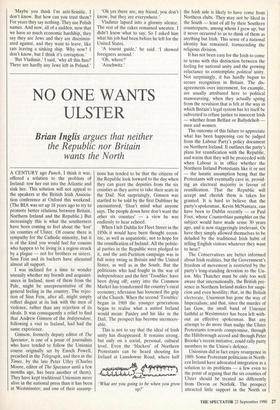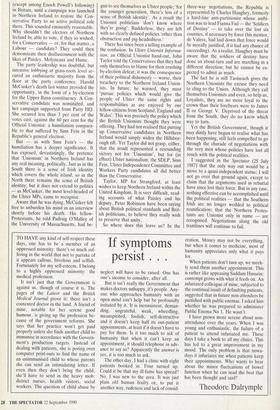NO ONE WANTS ULSTER
Brian Inglis argues that neither
the Republic nor Britain wants the North
A CENTURY ago Punch, I think it was, offered a solution to the problem of Ireland: tow her out into the Atlantic and sink her. This solution will not appeal to the speakers at the British Irish Associa- tion conference at Oxford this weekend. (The BIA was set up 18 years ago to try to promote better relations between Britain, Northern Ireland and the Republic.) But increasingly this is what the southerners have been coming to feel about the 'lost' six counties of Ulster. Of course there is sympathy for the Catholic minority, but it is of the kind you would feel for cousins who happen to be living in a region struck by a plague — not for brothers or sisters. Sinn Fein and its backers have alienated almost all support.
I was inclined for a time to wonder uneasily whether my friends and acquaint- ances in Ireland, most of them from the Pale, might be unrepresentative of the general feeling in the country. The rejec- tion of Sinn Fein, after all, might simply reflect disgust at its link with the men of violence, rather than any rejection of its ideals. It was consequently a relief to find that Ancfrew Gimson of the Independent, following a visit to Ireland, had had the same experience.
Gimson, formerly deputy editor of The Spectator, is one of a posse of journalists who have tended to follow the Unionist course originally set by Enoch Powell, preached in the Telegraph, and then in the Times, by the late Peter Utley (Charles Moore, editor of The Spectator until a few months ago, has been another of them). They have kept traditional Unionism more alive in the national press than it has been at Westminster; and one of their assump-
tions has tended to be that the citizens of the Republic look forward to the day when they can greet the deputies from the six counties as they arrive to take their seats in the Dail. Not surprisingly, Gimson was startled to be told by the first Dubliner he encountered, 'Don't mind what anyone says. The people down here don't want the other six counties' — a view he was endlessly to hear echoed.
When I left Dublin for Fleet Street in the 1950s it would have been thought eccen- tric, as well as unpatriotic, not to hope for the reunification of Ireland. All the politic- al parties in the Republic were pledged to it, and the anti-Partition campaign was in full noisy swing in Britain and the United States, as well as in the South. But the politicians who had fought in the war of independence and the first 'Troubles' have been dying off; entry into the Common Market has transformed the country's rural economy; television has loosened the grip of the Church. When the second 'Troubles' began in 1969 the younger generations began to realise what a united Ireland would mean: Paisley and his like in the Dail. The prospect has become inconceiv- able.
This is not to say that the ideal of Irish unity has disappeared. It remains strong, but only on a social, personal, cultural level. Even the 'blackest' of Northern Protestants can be heard shouting for Ireland at Lansdowne Road, where half
'What are you going to be when you grow up?'
the Irish side is likely to have come from Northern clubs. They may not be liked in the South — least of all by their Southern counterparts, among whom I grew up; hut it never occurred to us to think of them as anything but Irish. This sense of a national identity has remained, transcending the religious division.
It has not been easy for the Irish to come to terms with this distinction between the feeling for national unity and the growing reluctance to contemplate political unity. Not surprisingly, it has hardly begun to secure recognition in Britain. The dis- agreements over internment, for example, are usually attributed here to political manoeuvring, when they actually spring from the revulsion that is felt at the way in which Britain's legal system has let itself be subverted to refuse justice to innocent Irish
— whether from Belfast or Ballydehob — men and women.
The outcome of this failure to appreciate what has been happening can be judged from the Labour Party's policy document on Northern Ireland. It outlines the party's plans for reunification with the Republic, and warns that they will be proceeded with when Labour is in office whether the Northern Ireland Protestants like it or not
— the lunatic assumption being that the Protestants will eventually cave in, provid- ing an electoral majority in favour of reunification. That the Republic will accept and cherish them is taken for granted. It is hard to believe that the party's spokesman, Kevin McNamara, can have been to Dublin recently — or Paul Foot, whose Counterblast pamphlet on the subject would have made sense 30 years ago, and is now staggeringly irrelevant. Or have they simply allowed themselves to be deluded by the traditional Irish habit of telling English visitors whatever they want to hear?
The Conservatives are better informed about Irish realities, but the Government's freedom of movement is restricted by the party's long-standing devotion to the Un- ion. Mrs Thatcher must be only too well aware that internationally, the British pre- sence in Northern Ireland makes for suspi- cion and even hostility; that, in the British electorate, Unionism has gone the way of Imperialism; and that, since the murder of Ian Gow, the small band of Unionist faithful at Westminster has been left with- out an effective spokesman. But any attempt to do more than nudge the Ulster Protestants towards compromise, through the Hillsborough accord and through Peter Brooke's recent initiative, could rally party members to the Union's defence.
Unionism did in fact enjoy resurgence in 1989. Some Protestant politicians in North- ern Ireland have advocated integration as a solution to its problems — a few even to the point of arguing that the six counties of Ulster should be treated no differently from Devon or Norfolk. The prospect attracted little support in the North or (except among Enoch Powell's following) in Britain, until a campaign was launched in Northern Ireland to restore the Con- servative Party to an active political role there. This sounded eminently reasonable. Why shouldn't the electors of Northern Ireland be able to vote, if they so wished, for a Conservative — or, for that matter, a Labour — candidate? They could then demonstrate their disillusionment with the likes of Paisley, Molyneaux and Hume.
The party leadership was doubtful, but intensive lobbying at grass-roots level se- cured an enthusiastic majority from the floor at the party conference. Harold McCusker's death last winter provided the opportunity, in the form of a by-election for the Upper Bann constituency. A Con- servative candidate was nominated, and her campaign supported from Party HQ. She secured less than 3 per cent of the votes cast, against the 60 per cent for the Official Unionist: a humiliation compara- ble to that suffered by Sinn Fein in the Republic's general election.
But — as with Sinn Fein's — the humiliation has a deeper significance. It has exposed, devastatingly, the pretence that 'Unionism' in Northern Ireland has any real meaning, politically. Just as in the South there is a sense of Irish identity which covers the whole island, so in the North there remains the sense of British identity; but it does not extend to politics — as McCusker, the most level-headed of the Ulster MPs, came to recognise.
Aware that he was dying, McCusker felt free to unburden his mind in an interview shortly before his death. His fellow- Protestants, he told Padraig O'Malley of the University of Massachusetts, had be-
gun to see themselves as Ulster people; 'for the younger generation, there's less of a sense of British identity'. As a result the Unionist politicians 'don't know where they're going'. Rudderless, they are left with no clearly defined policies 'other than obstruction and pig-headedness.'
There has since been a telling example of the confusion. In Ulster Unionist Informa- tion, an Official Unionist hand-out, John Taylor told the Conservatives that they had only themselves to blame for their crushing by-election defeat; it was the consequence of their political dishonesty — worse, their treachery to the Northern Ireland Union- ists. In future, he warned, they must 'pursue policies which would give the people of Ulster the same rights and responsibilities as are enjoyed by our fellow-citizens from Scotland, England and Wales'. This was precisely the policy which the British Unionists thought they were offering. They had not realised that putting up Conservative candidates in Northern Ireland would simply widen the Hillsbor- ough rift. Yet Taylor did not grasp, either, that the result represented a resounding victory not for 'Unionism', but for (in effect) Ulster nationalism; the SDLP, Sinn Fein, Ulster Independence Committee and Workers Party candidates all did better than the Conservative.
Taylor, MP for Strangford, at least wishes to keep Northern Ireland within the United Kingdom. It is very difficult, read- ing accounts of what Paisley and his deputy, Peter Robinson have been saying about British political standards and Brit- ish politicians, to believe they really wish to preserve that unity.
So where does this leave us? In the
three-way negotiations, the Republic is represented by Charles Haughey, formerly a hard-line anti-partitionist whose ambi- tion was to lead Fianna Fail — the 'Soldiers of Destiny' — to take over the lost six counties, if necessary by force (his mentor, de Valera, had laid down that force would be morally justified, if it had any chance of succeeding). As a realist, Haughey must be aware that the soldiers of destiny have done an about-turn and are marching in a different direction; but he cannot be ex- pected to admit as much.
The fact he is still Taoiseach gives. the Northern Unionists the excuse they need to cling to the Union. Although they call themselves Unionists and even, so help us, Loyalists, they are no more loyal to the crown than their forebears were to James II or George V. Deprived of the threat from the South, they do no know which way to turn.
Yet the British Government, though it may dimly have begun to realise what has been happening, still feels compelled to go through the charade of negotiations with the very men whose policies have lost all touch with the political realities.
I suggested in the Spectator (25 July 1987) that the only way out would be a move to a quasi-independent status; I will not go over that ground again, except to claim that the arguments used in rebuttal have since lost their force. But in any case, nothing effective can be accomplished until the political realities — that the Southern Irish are no longer wedded to political reunification; that the Northern Protes- tants are Unionist only in name — are recognised. Negotiations along the old tramlines will continue to fail.



































































 Previous page
Previous page